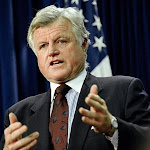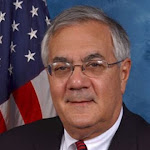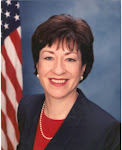Chris Dodd and company have forced in a new era for the Democratic Party
The triple whammy can be seen as passing of the torch, "the promise of change coming full circle"
This moment could potentially define the party for years to come
Over the past couple of days, the Democratic Party has been handed some incredibly tough news in the retirement of 2 prominent Senators Chris Dodd, Byron Dorgan, and Governor Bill Ritter of Colorado.
What's immediately obvious is that the future of the Democratic Party has been significantly changed in a matter of a few hours.
To what extent is to be determined, but I believe there's a certain dynamic here that is being missed by a lot of people, particularly the other party (although, no surprise there).
I don't think anyone truly expected the party to maintain a filibuster proof majority past 2010 or maintain similarly strong majorities in the House, but for some odd reason many news networks are jumping on the issue as if it was somehow a foregone conclusion that the party would stay solidly in power. History proves seats will be lost in next year's elections.
What we must not forget is that in 2008, it wasn't just President Obama that ran on the platform of change. The Democratic Party did the same. We did the unprecedented then-we won a near filibuster proof majority and within months actually had that super majority to have sole control in dictating national policy political parties only dream of.
Change didn't mean ultra-liberal, change didn't mean center left, change didn't mean progressive. Change referred to fundamental change, first and foremost through policy initiatives, and second through moving towards a new generation of leaders. Congress attempted to change the deep partisanship that went on to the unrelenting resistance from Republicans, in effect killing any hopes of accomplishing anything.
When we Illinois college students campaigned in the primaries in 2007 for President Obama in Iowa, walking door to door trying to build support for a candidate from Illinois that we quickly found out had virtually no name recognition, we didn't go around bashing Hillary and dissing on John Edwards.
What we did do was go around having conversations with people and hearing directly from them that they simply wanted fundamental change. Voters weren't looking for a health care reform position with a public option, they wanted sweeping and fundamental change in Washington and in the country. At almost every door that was opened to me I kept hearing that they were tired of the same people promising the same things and failing to come through.
What was most striking at the time was hearing that people really did WANT to trust the government. People aren't always pointlessly cynical.
They've been duped over and over and are sick of it. They placed their trust in this unknown candidate and this party because unlike the opposition, this party had confidence not seen since Ronald Reagan's GOP, a willingness to take on an increasingly contrarian opposition, a pretty good history of economic success, and because of a brand new party leader that had ignited new hopes for better days.
Over time, people realized that even with a new President, those who ended up controlling the actual policy are the same congressmen who have been re-elected for decades. People tend to think that with the same old faces you get the same tricks and no action. They don't trust career politicians although they tend to re-elect them successively. This has come to change since this past election cycle with underdog democrats bringing on strong primary challenges to establishment candidates and the softening of once safe blue and red seats.
It would be presumptuous for us to believe that these career politician's passion about causes such as health care to be illegitimate. Ted Kennedy sure never did waver in trying to get Health Care reform done, and Chris Dodd was never too far behind in helping Ted accomplish what he could with his help.
The Democratic Party has been able to use their majority in the legislature to pass monumental moves to fix the economy, to fix health care, and to offer some reform to the financial system. There is one year left to get the most pressing things on the agenda done with things as they are.
Whether you think what they've done has been inadequate, what we must really be thankful for as liberals, democrats, and those opposed to republican policy is the fact that we've been given this rare opportunity to pass sweeping legislation to guide this country in the way that we have. This has been an incredibly unique moment in history that perhaps may not ever happen again.
When the new congress gets sworn in spring 2011, all us liberals will be grounded back to earth off of our little power high that we've had over the past year. We will be reminded that the Senate is called a deliberative body for a reason, and suddenly remember Alexis D Tocqueville and James Madison's warnings against a tyranny of the majority.
We will begin the day with three of the longest serving Senators gone in what could be described as a passing of the torch to a new generation of American politicians and a new era in American politics. Whether you take Dodd at his word or not, Chris Dodd isn't a pushover and much less a weak politician. If he and the two other Senators felt like they had much more to provide to the country now that health care and the economy have been addressed, tough campaigns or not, they would've done so valiantly.
The reality that bears on us is that over the next several years, names like John McCain, Orrin Hatch, Robert Byrd, and Patrick Leahy will cease to be talked about as they slowly begin to wave farewell. They will no longer be part of the U.S. Legislature and any remnants of 20th century America begin to be taken over by a new youthful and invigorated generation of politicians and activists.
Senators have expressed regret at the new state of polarization that have caused a complete cessation of bipartisanship in congress.
Dodd, Dorgan, and Ritter are forcing us to re-evaluate how we act and what our game plans for our party's future will be with good cause. As their gift to Americans and a gift to this party, their retirement is the promise of 'change' coming full circle. The policy came first in 2009, the personnel transition in 2010 and beyond.
In 2011, the jig is up. In order to get things done, dems will need to reach across the aisle as the legislature was meant to operate, and republicans will need to seriously engage when it comes to crafting policy if they ever want to be in power again.
America won't survive long if this spirit of hyper-partisanship doesn't stop and stop soon. Citizenship, not bipartisanship.






























































No comments:
Post a Comment